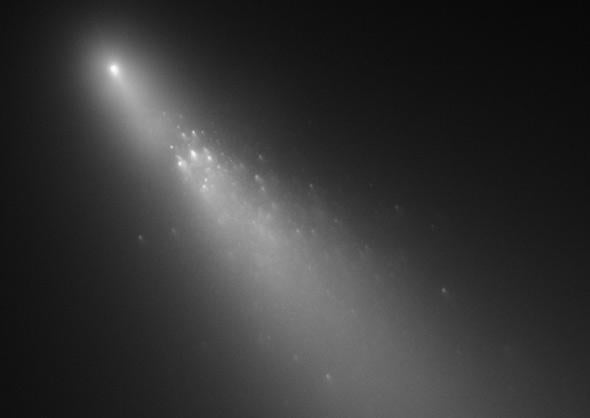Comet C/2012 S1 (ISON) has been full of surprises; it’s been fulfilling our hopes of being a bright and spectacular object. Along with that hope of it being wonderful is also the cautious fear that it might disintegrate as it passes the Sun. Why?
We think this is the first time it’s entered the inner solar system, so it’s still loaded with ice. That ice turns into gas and surrounds the nucleus, making the comet bright. It also forms the long tail. But a comet is actually a mix of ice, rocks, gravel, and dust; a bit like concrete, and it’s the ice that holds the comet together. It’s possible that if enough of the ice goes away, the comet could disintegrate. We’ve seen this happen many times before, such as with the comet 73P/Schwassmann-Wachmann 3, pictured at the top of this post, when it fell apart in 2006.
A report has just come in from Michal Drahus, a postdoctoral astronomer at Caltech, saying that far-infrared observations of the comet show a sudden drop in light emitted by certain kinds of molecules (specifically HCN embedded in ice), while others are reporting that, at roughly the same time, the comet has apparently blasted out a lot of dust. This is not yet confirmed, but a possible explanation is that the comet disrupted.
That’s not the only possible explanation! It’s been suggested (message #12) that ice is distributed approximately evenly across the surface of the comet, and is finally starting to be depleted. The comet may yet still be intact, and this observation was so recent (from earlier today) that we don’t yet know what’s going on. The comet is only a few degrees from the Sun right now, so observations are very difficult; we may have to wait for spacecraft data to see what’s what.
Every comet we observe is different, and this one is an outlier for sure; we’ve never before watched a comet coming in from the Oort cloud — the repository of billions of chunks of ice way outside Neptune’s orbit — pass so close to the Sun. The only thing we should expect is to be surprised!
In that manner, at least, ISON is performing right on target.
Stay tuned. I’ll post here if and when I get more information. Also, keep your eyes on the Comet ISON Observing Campaign (and the blog there), which has frequent updates.
And let me add: I’m seeing a sharp jump in silly conspiracy/doomsday YouTube videos and websites breathlessly claiming the Earth may get hit by ISON. These kinds of things pop up every time there’s a bright comet, and they’re simply wrong. Even if ISON falls apart as it rounds the Sun, it will miss the Earth by many millions of kilometers on its way out. In other words, it gets nowhere near us. Go look at my post “12 Cool Facts About Comet ISON” and scroll down to numbers 10 and 11. The Earth is quite safe from this object.
